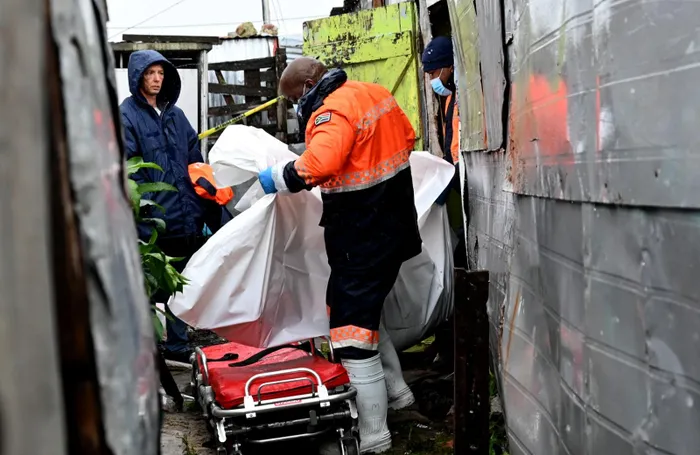Gugulethu mass shooting suspect released from prison days before attack

Lungile Anthony Madolo, aka Fire, appeared in court for eight counts of murder.
Image: Supplied / SAPS
THE man accused of the recent mass killing in Gugulethu where eight people were shot dead had just been released from prison after charges for another high-profile murder case were withdrawn against him.
Residents only became aware of Lungile “Fire” Anthony Madolo’s release from prison three days after on June 22. Six days later on June 28, police were looking for him in relation to the killing of Vuyolwethu Makongo, Siyanda Thongana, Afezile Thongana, Hlomla Thongana, Somile Vithela, Luyolo Zoneleni, Loyiso Jezile, and Phumlani Zoya.
He had been arrested in 2024 for the December 2023 murder of Lulama “Guffy” Dinginto, the deputy chairperson of the Gugulethu Community Police Forum, who was gunned down in her home. Madolo, known by the alias “Fire,” appeared for the first time in the Athlone Magistrate’s Court on Wednesday, facing separate charges related to the mass killing of eight people in Gugulethu’s Kanana informal settlement on June 28.

Eight people were shot dead in Kanana Informal Settlement, Gugulethu.
Image: Ayanda Ndamane / Independent Newspapers
Gugulethu CPF chairperson Deon Makiti said Madolo was released in relation to the 2023 incident on June 19, unbeknownst to the community.
“He was released on 19 June. The case was withdrawn provisionally, that's what the police said but they said the case will be brought up again they’re just fixing a few technicalities,” he said.
“Not many people knew about his release, we only found out three days later. We're still trying to get answers, everyone thought he was going to be locked up. Then, there was another shooting. Most people only found out about his release after the (most recent) shooting."
Madolo on Wednesday told the court he turned himself in after seeing his photo circulating widely on social media.In the days following the attack, police had released images of him and another man, Loyiso Matinisi, stating they could provide crucial information about the case. Authorities suspect the killings may be linked to gang-related activity or disputes within the area.
Makiti said there was shock, anger, and a deep sense of frustration in the community.
“People feel that it’s hard to trust the justice system when things like this happen. People are asking questions, he wasn’t even out for long and already he's a suspect again. How are we, as a community, supposed to feel about this whole situation? There’s not much more we can say. The frustration is real. People are still on edge because this was a mass shooting. Someone like Fire, if he’s released again, many believe he’ll just keep doing the same thing over and over,” he said.
He added that there was also a huge sense of mistrust in the community.
“People also don’t trust each other anymore because no one knows who might be working with him (Fire), or who could be the next target. The tension is still very present. Every day, people are trying to find out what’s really going on. Fear is a major factor and you can still feel the tension across the community. Police are still looking for a second suspect but people are staying quiet. We are trying to get the community to assist," Makiti added.
Police spokesperson, FC van Wyk said: “The accused was charged with murder cases in the past. These cases were provisionally withdrawn. The second suspect is still at large.”
According to criminologist Dr Simon Howell, if public trust is undermined, it affects policing capabilities.
“There’s been a lot of violence. If someone has become a suspect in such violence, and has recently just been released from prison, then that raises questions around due process and concerns with the department of corrections around allowing (certain) people out. (This) does completely undermine trust by the community in government and the criminal justice system more broadly. People tend to see the criminal justice system through the lens of the police. They don’t see the criminal justice system as a broader entity which has multiple different institutional departments or components. As such when such things happen, it's generally the police that get the (blame) and police get seen in a bad light.
"Which ultimately undermines the ability to police places which rely on a significant level of crime intelligence in order to act responsively in any effective way. So the undermining of public trust ultimately undermines policing efficacy, which further undermines public trust. So we end up in this negative feedback loop, which is where we are at the moment," Howell said.
Cape Times